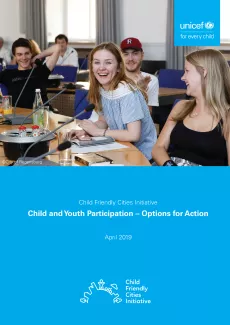Child and Youth Participation – Options for Action
Child Friendly Cities Initiative

- Available in:
- 中文
- English
Highlights
A Child Friendly City is a city or community where the local government is committed to implementing the Convention on the Rights of the Child by translating the rights into practical, meaningful and measurable results for children. It is a city or community where the needs, priorities and voices of children are an integral part of public policies, programmes and decision making.
Recent years have shown a significant growth in the implementation of the Child Friendly Cities Initiative (CFCI), and today the CFCI reaches up to 30 million children in 40 countries.
Participation is a fundamental right of every child – children of all ages, from all communities, of all abilities, and in all parts of society. None must be excluded. Enabling children to be involved in decisions that affect them is an inherent recognition of human dignity. It is also a means for realizing other rights, including protection and ensuring that local policy is responsive to children’s needs and priorities.
Children’s participation is consequently integral to the creation and implementation of the CFCI at the local level, where children’s active citizenship can be exercised more easily and immediately than at the national level.
The perspectives of children are essential to ensure that the policies, services and facilities they use or affect them reflect and address their concerns, ideas and priorities. Children have unique insight into their own lives, which will offer important perspectives that are likely to be missed if excluded.
Furthermore, through participation, children acquire greater competencies, skills and knowledge that in turn benefit the communities in which they live. Presenting child participation, not only as a child rights issue, but also as a way to strengthen key local services, may motivate local leaders to demonstrate commitment.
As the child rights situation and the commitment to engage with children and young people vary from country to country, it is important to understand the specific factors in any given context that might support or hinder meaningful participation in the CFCI.
This brief offers guidance and suggestions on how children and young people can participate in decisions involving their lives through the CFCI and, more broadly, within their local communities.
It introduces the principles of meaningful and inclusive child participation (Chapter 2) and offers options for action throughout the CFCI cycle, from setting up the CFCI to evaluating progress (Chapter 3). At the end of the document, a list of additional reading material is available, as well as the CFCI Child Safeguarding Guidance (Annex I).
The brief intends to inform and inspire all stakeholders involved in the CFCI by providing a mix of guidance and good practices from existing CFCIs.
The CFCI engages children under the age 18 and young people between the age of 18 to 24.




